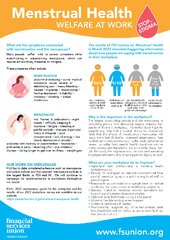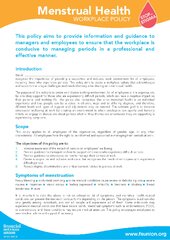Menstrual Health
Menstrual Health Click the poster image to downlaod and print the poster for your workplace or register beloew to receive a printed version in the post | Best Practice Policy Document Click the policy image to downlaod and print a copy for your workplace or register beloew to receive a printed version in the post |
What are the symptoms associated with menstruation and the menopause?
Many people suffer mild to severe symptoms whilemenstruating or experiencing menopause, which canrequire extraordinary measures to mitigate.
These symptoms often include:
MENSTRUATION • abdominal cramping • some medical conditions cause severe or debilitating pain • heavy bleeding • nausea • migraines • mood swings • feeling depressed • irritability • tiredness • bloating • breast tenderness
MENOPAUSE • hot flushes & palpitations • night sweats • difficulty sleeping & insomnia • fatigue • bleeding or painful periods • changes in periods/heavy or irregular • poor concentration • lack of energy • low mood, depression or anxiety • problems with memory or concentration • headaches • joint aches & pains • recurring UTIs • skin irritation/dryness • taking longer to get over an illness • weight gain
Why is this important in the workplace?
The stigma surrounding periods and the menopause is preventing people from discussing ways to improve their quality of life in the workplace. If a worker doesn’t get the support and help that is needed, it may be increasingly likely that the effects of menstruation/menopause will make them feel ill, lead to increased absenteeism, lose confidence to carry out their job, suffer work performance issues, or suffer from mental health conditions such asstress, anxiety, and depression, and potentially leave their job. Removing the stigma around periods and educatingemployers are essential to ensuring period dignity at work.
What can your workplace do to improve?
- Implement and communicate a menstrual health workplace policy
- Training for managers on medical conditions that have painful menstrual symptoms and training for all staff on period stigma
- Reasonable accommodation or special leave for medical conditions that cause severe or debilitating symptoms
- Absence related to menstrual medical conditions not triggering performance improvement plan
- Option to work from home during a bad period
- Access to flexibile working when required
- Additional rest breaks if needed
- Environmental supports eg: office temperature, desk fans, breathable uniform fabrics, access to wash facilities, free period products
*To find out more about our work on Menstrual Health and Menopause issues go HERE

